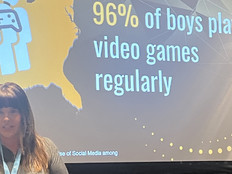Game-Based Learning Takes Partisanship out of Civics Lessons and Provides Insight
When it comes to teaching students about the government, it’s hard to be nonpartisan — whether you are in a red or blue state. Teachers found this to be especially true during the contentious 2016 election, Education Week reports.
“Middle school students can be cruel,” says Jeff Caron, a U.S. history teacher at Mayfair Middle/High School, in the article. “It’s up to me to make sure that everybody can be heard and can express themselves without being shot down.”
Thankfully, there is iCivics, a nonprofit founded by former Supreme Court Justice Sandra Day O’Conner that has developed a set of free nonpartisan web-based educational games designed to teach students about the processes of the government.
Education Week reports that play of the games peaked during the election.
“Through our games, the player steps into any role — a judge, a member of Congress, a community activist fighting for local change, even the President of the United States — and does the job they do,” reads the iCivics website.
With all states requiring students take a social studies or civics course to graduate from high school, Education Week reports many teachers have turned to the iCivics games and additional curriculum to help students understand the processes.
Jo Phillips, a civics teacher at Ripley High School in West Virginia, tells Education Week that she initially casually tested the games out with her students in a computer lab, but now that every student has a school-issued device it has become a key part of the curriculum.
“One of the things I like about iCivics is that it’s a place for students to go where they’re not going to get angry, because you know it’s not going to be slanted,” says Phillips in the article.
The games offer insight into the roles and responsibilities of the executive office by allowing students to act as the president in his or her first 100 days. Caron tells Education Week that since students truly understand the processes through playing the role, they are able to engage in educated conversations about it instead of just their political opinions.
Game-Based Learning Proves to Be Effective for Complex Subjects
Similar to how iCivics illustrates government processes, other game-based learning models are proving to be good classroom tools for other complicated subjects.
“The introduction of games and technology into the classroom provides many unique experiences for children that enhance subject area knowledge,” writes education expert Matthew Lynch on his blog, The Tech Edvocate. “In particular, games offer children and young adults a hands-on approach to course content which provides additional motivation for students to learn and understand the curriculum.”
One study out of North Carolina State University examined the implementation of an adventure game that addressed key components of the maps and models required by upper elementary science curricula.
“The results of the classroom integration study suggested that game-based learning environments not only increase student engagement but also positively impact content knowledge on science topics and problem-solving skills,” the study reports.
This idea of using games to help teach scientific concepts in a hands-on way was the impetus behind Legends of Learning, a web-based library of curriculum-aligned science games that were shown to be effective by a Vanderbilt University study.
Legends of Learning co-founder Vadim Polikov tells EdTech that one game helps explain planetary gravitational pull by allowing students to experience it firsthand.
“As a teacher, I can talk about gravity all day long, but if the students play the game and experience it, they understand it,” says Polikov.








